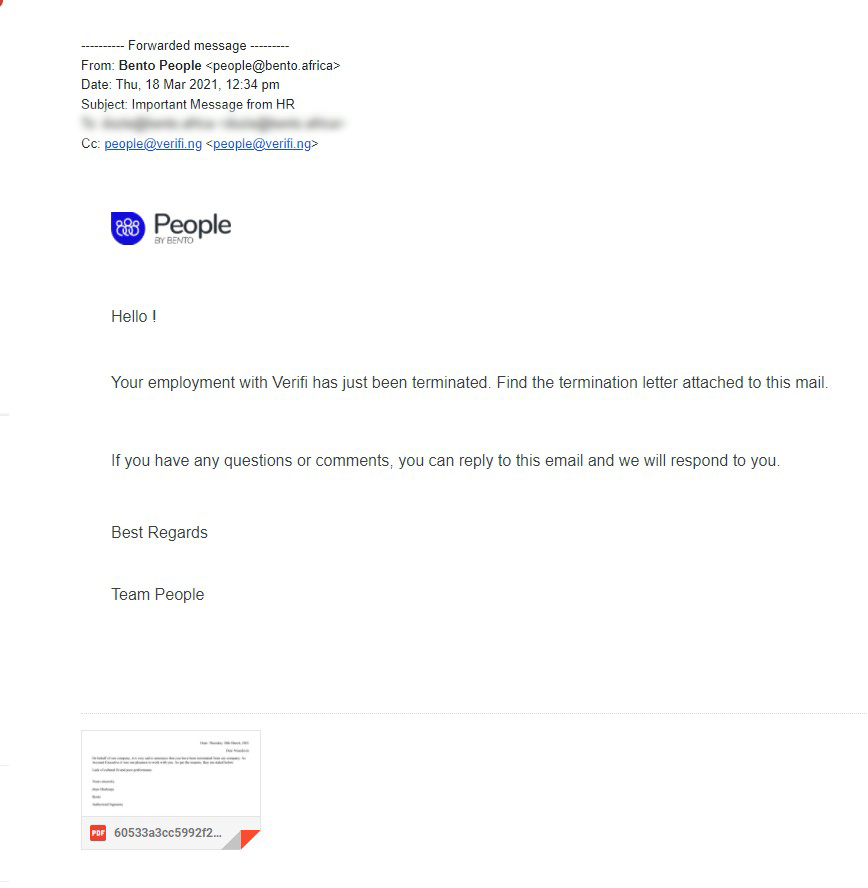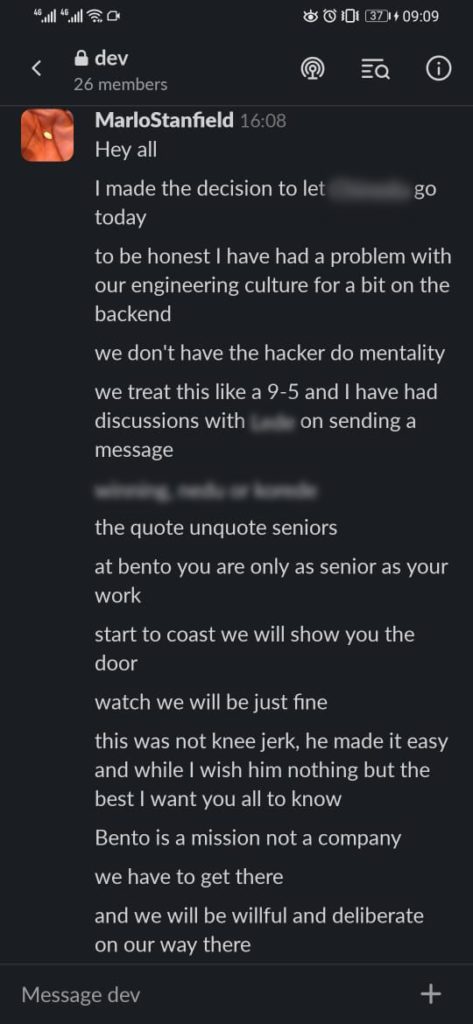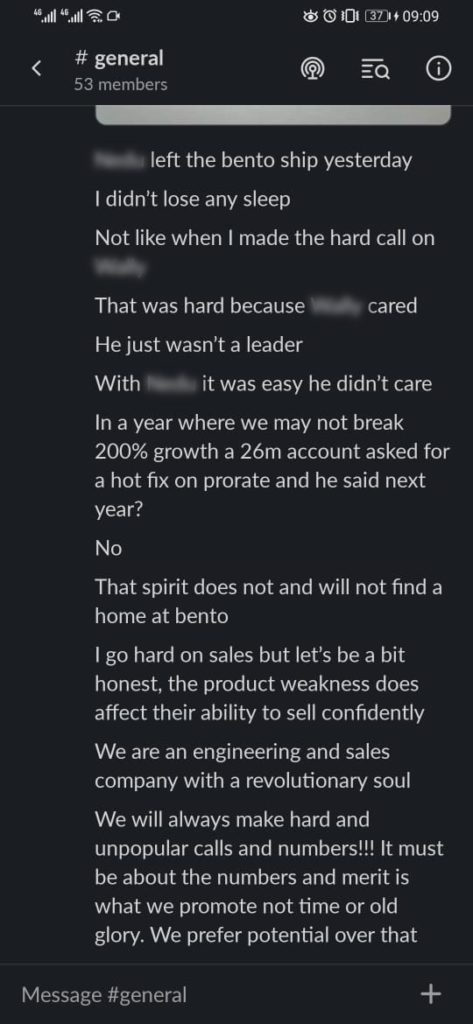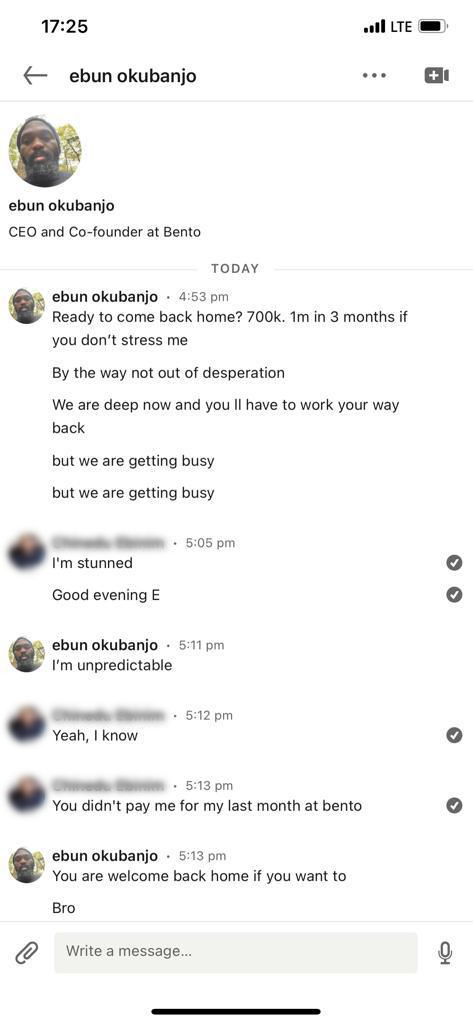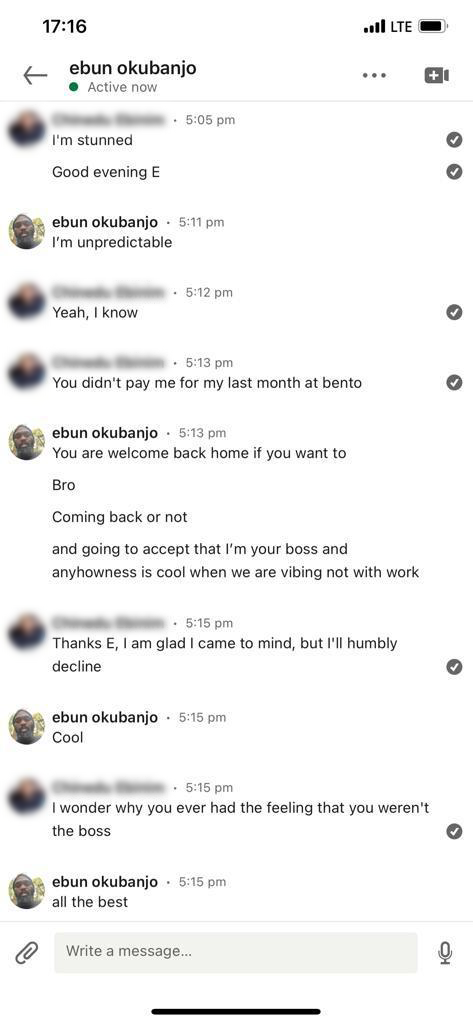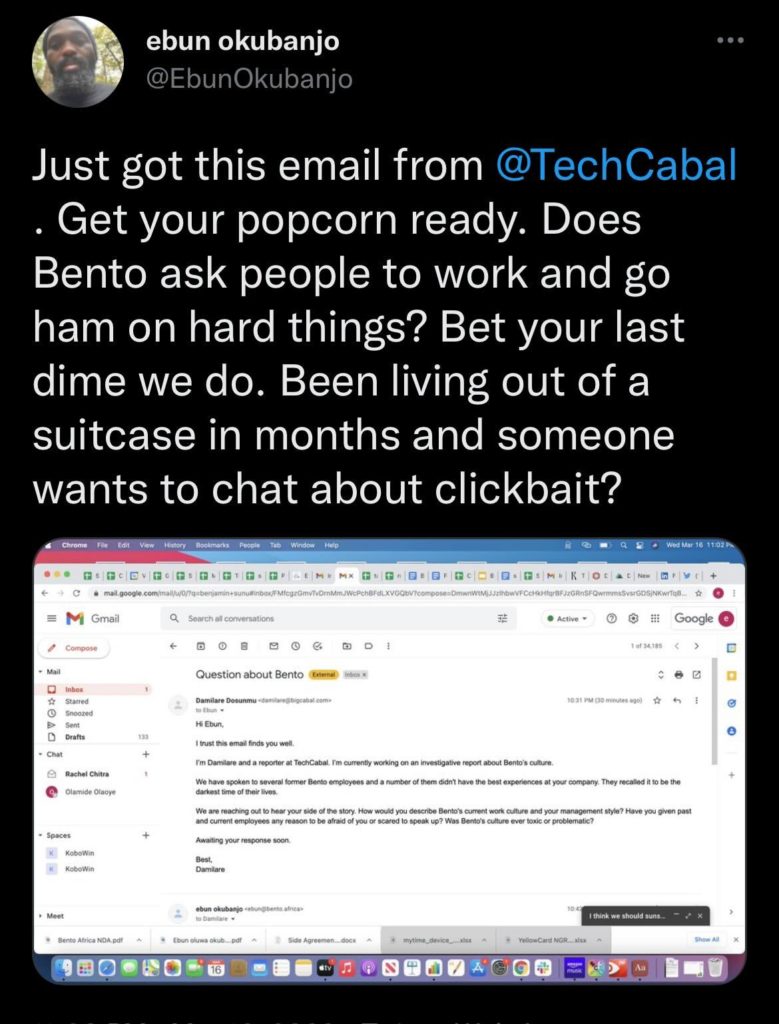“Bento took everything from me—my sense of humanity, sanity, confidence, and trust,” Pascal*, an ex-sales executive at Nigerian payroll startup Bento Africa, said about his time working there. “We worked around the clock. Ebun [CEO and co-founder of the company] would send you messages by 2 AM and expect a response asap. No rest. We went to bed every night praying our jobs would still be there when we woke up the next morning.”
On March 18, 2021, Pascal’s prayer, which had seemed to work for over a year, stopped working. He was abruptly fired from his job. He fell into a depressive state, and everything stopped making sense. He stopped going out, and his relationships with friends and family suffered. Even though he said working at Bento for over a year had been torture, it was all he had at the time.
Bento Africa (formerly known as Verifi.ng) is the brainchild of Ebun Okubanjo and Chidozie Okonkwo, his friend, business partner, and Bento’s Chief Operating Officer (COO). Headquartered in Lagos, Nigeria, Bento provides payroll management software to 900 businesses, including Hygeia, Paystack, Kobo360, Branch, and LORI Systems.
Okubanjo and Okonkwo built, and still run, multiple businesses together. While both co-founders flock together, they aren’t quite of the same feather. All ex-employees who spoke to us described Okubanjo as fire and Okonkwo as neither water nor fire; Okonkwo simply remains in the background, silent and rarely engaged in the company’s day-to-day operations. These ex-employees therefore believe that Okonkwo’s attitude outsources all authority to Okubanjo and enables his toxicity.
In Okubanjo’s termination email to Pascal, he was fired because of a “lack of cultural fit and poor performance”. But Pascal wondered: “How could I have been culturally unfit and incompetent after working for you for over a year? Why did it take you that long to clock my incompetence?”

He said, despite the daily verbal assaults he endured in the hands of Okubanjo, all he wanted to do was to be the best salesperson in the company and make his employer proud. He hadn’t done much work in sales prior to Bento, so he put in the work. Within 5 months, according to him, he had the second-highest number of clients on their sheets at the time. He closed some of the biggest clients—some of them with over 1,000 employees and a monthly payroll worth ₦15–₦20 million (~$47,000).
Despite his achievements, however, Pascal did not succeed in making his boss proud. “There was no free day from Ebun’s verbal abuse. If he wasn’t calling me a useless person, he was threatening to beat me up,” Pascal said. At some point, while recounting his experience to TechCabal, he paused to catch his breath.
Pascal described his time at Bento as the darkest period of his life.
Pascal narrated how employees would weep during the sales team’s check-in call at 8 AM every weekday. Okubanjo harshly criticised their work and threatened to fire them all at these meetings.
Ezekiel*, who had worked with the company’s growth marketing team, shared his experience with TechCabal. He had joined one of the sales calls and heard Okubanjo calling them “pussies and deadweights”. He also heard Okubanjo tell the team that they smelled. “Even though he never attacked me personally,” Ezekiel said, “I always wondered how anybody could go through that every morning and remain sane.”

Ex-employees also revealed gaps in Bento’s employment contract, specifically where leave days and time off were concerned. Okubanjo promised employees that they could take time off when they needed it, but Bola*, another ex-employee from the company’s sales team, dispelled that promise as a myth.
“I can count on one hand how many people took leave during my stay there. Ebun said breaks are for pussies and fuckers, and whoever takes time out of the office for a whole week is a weak member of the team and not needed in the organisation,” said Bola.
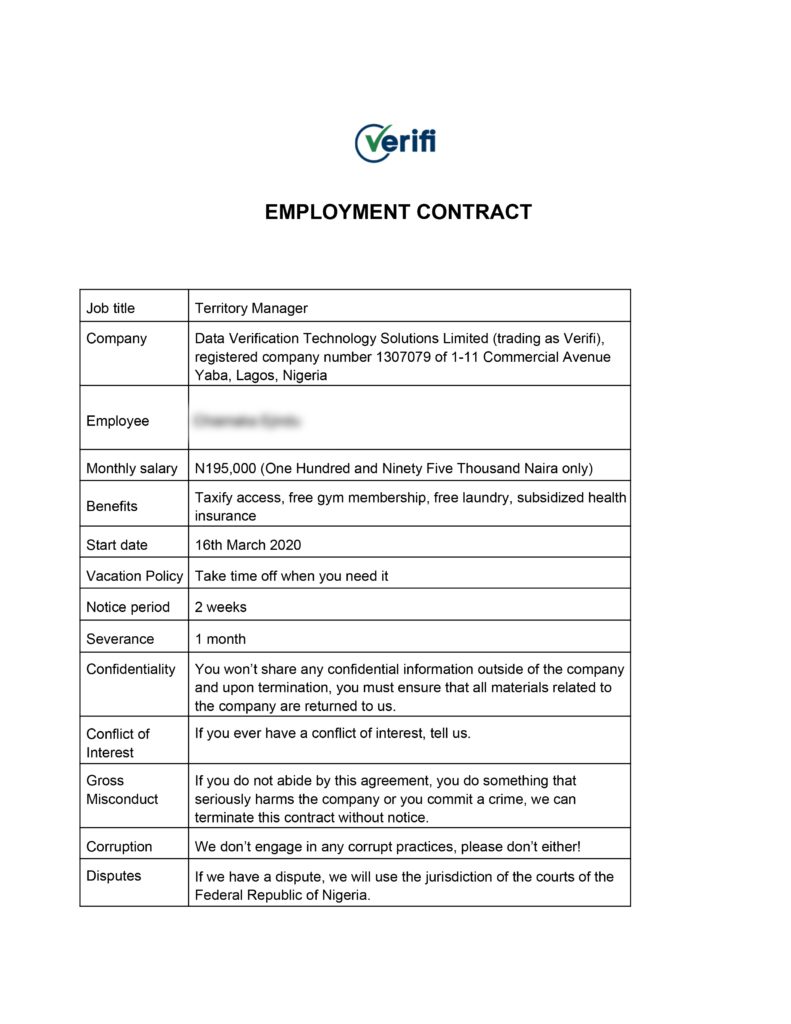
“Ebun scarred me,” she said. “I have spent money on therapy, yet, I still suffer from anxiety.”
In her early days at the startup, Bola asked a lot of people to come work with her at Bento. At that time, she was ignorant of Okubanjo’s “terrifying personality”. “Had I known about it, I wouldn’t have asked anybody to join Bento. Now, when a prospective Bento employee reaches out to me, I just tell them to run!”
According to the sources we spoke to, Okubanjo rarely welcomed alternative opinions and monopolised making key business decisions; the punishment for criticising his ideas was immediate termination of employment. For a number of Bento ex-employees, termination simply entailed deactivated Slack accounts and emails.
Tinu*, who had been poached from another company to come join Bento, woke up one day and found out she’d been fired and logged out of her Slack and work email. She’d only been with the company as Communication Lead for less than 3 weeks.
“It was a nerve-wracking experience and the worst 5 months of my adult life,” said Amaka*, who was excited to join a tech startup in Nigeria after finishing her studies in the US. She was fired after enduring Okubanjo’s insults and unwarranted comments about her body.
“I’m a plus-size woman and Okubanjo would always have opinions about my dressing. He once told me to stop wearing dresses, that I need to wear jackets, trouser and suit all the time (presumably to cover my breast) after his girlfriend Alice commented that she liked my breast. What did I wear? Regular dresses that even my mother approved of.”
Amaka likened the day she was fired to a scene out of a movie. “We were on a sales call, and Ebun kept saying I wasted company resources while bringing in zero value.” Okubanjo accused her of charging her personal Bolt ride on the company’s debit card, unaware that Amaka had stopped using the card entirely and even ran the company’s errands with her own car.
Following Okubanjo’s accusation, Amaka asked that the card be audited to ascertain whether she had indeed been wasting the company’s money. Okubanjo checked the card and discovered that she hadn’t been using the card for personal expenses. Rather than apologise to her, he changed tack and started accusing her of not working.
“He called me useless and told me to f*ck off from the call. Next thing I knew, my colleagues were texting to inform me that he’d fired me after I dropped off the call.”
Similarly, when Kunle*, a lead engineer who worked for the company for over 2 years, was fired last November, he only found out about it when he couldn’t access his Slack and work email the next morning. “Ebun fired me because he felt like I was trying to wrest authority from him,” said Kunle.
“Leave Ebun, that man can literally kill you and brag about it. He’s that vindictive,” Ezekiel had mentioned while speaking to TechCabal. Ada*, another ex-staff, had also specifically declined to speak to us because she was worried about her safety, fearing that her former employer, could hurt her.
In the images above, Okubanjo referred to himself as Marlo Stanfield on Bento’s Slack. Who is that, you may ask?
Marlo Stanfield is a fictional character on the HBO television drama The Wire. He is a young, ambitious, intelligent, and ruthless gangster. In the drama series, Stanfield demanded unconditional respect, which superseded all other concerns. He was murderously narcissistic, and frequently ordered the deaths of those who disrespected or undermined him. In 2016, Rolling Stone ranked him number 2 on their list of “40 Greatest TV Villains of All Time”.
The day before Kunle was fired, the company’s CTO Lede Adeniyi was on leave, so Kunle stepped up to lead the engineering team. Kunle recalled that one of the account executives had told him that a customer wanted a feature that was not in Bento’s product roadmap for the year. Kunle said he explained to the executive that the company had prioritised other fixes and features for the year and would include the requested feature on their first sprint in 2022. He, however, suggested that if the customer wanted the feature added quickly, he could talk to Okubanjo.
“I referred the executive to Ebun because Ebun had already accused me, previously, of setting priorities behind him. But even that was a crime,” said Kunle. The executive went to Okubanjo with their request, as Kunle had suggested, and all hell broke loose.
“I remember how Ebun came to shout at me: ‘Hey motherfucker, what did you say to a customer about their ask?’ He shut me up before I could even answer and called me names, which was normal. I was his usual point of reference whenever he wanted to benchmark weaknesses and redundancy in the team. Imagine being disrespected in front of your team members every day.”
Now, before the November firing, Okubanjo had fired Kunle once before. It happened on a trip to Ghana. Kunle had asked Okubanjo to stop calling him a monkey. Okubanjo responded to that by firing him on the spot. “He told me to find my way back to Nigeria, and that he didn’t care how I did it.” But then, he called Kunle after a few hours to give him his job back, knowing he needed him to sort out the business operations they had come for in Ghana.
On November 22, when Okunbanjo fired Kunle for the second and final time, he refused to pay his November salary and severance pay. Kunle reached out to Adeniyi, the CTO, to help him speak to Okubanjo about his owed payments, but Adeniyi couldn’t do anything about it. “You know Ebun does what he wants,” Kunle recalled Adeniyi saying to him.
When TechCabal reached out to Adeniyi for comment on the incident, he confirmed Kunle’s report: “Yes, Kunle asked me to follow up with Ebun, which I did, and Ebun promised to pay him.” It’s been 4 months now and Okubanjo still hasn’t paid Kunle.
But after Kunle got fired, it seemed his former boss wasn’t done with him.
“Last month, just when my mental health was getting back in shape, Ebun popped up on my LinkedIn, offering me my old job back,” Kunle said. “I declined. Such effrontery! No form of apology. I haven’t found a new job yet because I’m scared of working in another Nigerian startup.”
Kunle claimed that Ebun sacked his friend John*, a former member of Bento’s design team, because John was talking a lot about web3 on social media. Okubanjo accused John of finding Bento “less interesting”. TechCabal reached out to John through Kunle but he hasn’t replied.
“You can’t give Okubanjo notice period when you’re leaving the company. He’d fire you and tell you off,” Ezekiel said. “When Ebun fires you, he tells you to watch how he’ll make sure you don’t get a job anywhere else in the ecosystem.”
Tare Johnson, Bento’s ex-accountant and financial analyst, believes this was why he couldn’t find a job for 6 months after leaving Bento in August 2020. When Johnson joined Bento in February 2020, his contract stated that he was coming in to lead the finance team. He would later find out that there was no team, and that he would be leading himself while reporting to a “narcissistic boss”.
“I was basically the only one handling all the company’s finances. I was also doing clerical jobs and running errands like a personal assistant, which was confusing and not even remotely close to my job description,” said Johnson. “My initial thought was, ‘It’s a startup and things move around a lot.’ But I was wrong. This place was designed to break employees. Ebun abused me verbally, which is standard behaviour for him with employees. He’d call me a motherfucker, dullard, and every vulgar word in the dictionary. He even insulted my family.”
Johnson, running a one-man finance team, was stuck in a mess he hadn’t bargained for. The pandemic lockdown hit barely a month after he got the job, locking him into the job at a time when companies were laying people off and not hiring. So he stuck around and took all the verbal abuse Okubanjo hurled at him. After 5 months, he figured he was coping, until an event on Monday, August 17, 2020 made him resign without notice.
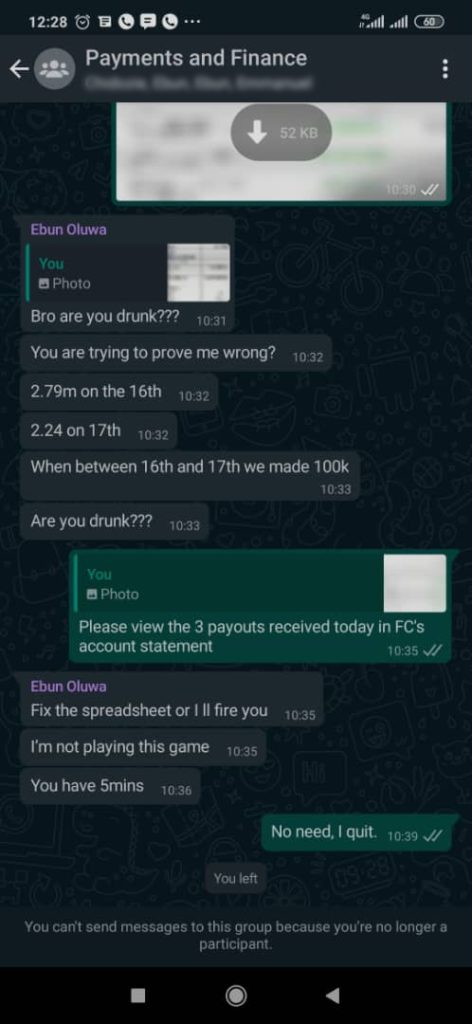
That Monday, Johnson—like he had done every morning—shared the company’s daily bank statements to Okubanjo and Okonkwo on WhatsApp. Upon receiving them, Okubanjo replied with: “Bro, are you drunk???” Johnson thought he must have made a mistake somewhere on the statements, so he quickly double-checked before re-sharing the statements with Bento’s founding team. Okubanjo was still not satisfied with the statements. Apparently, some recent transaction hadn’t reflected yet in the company’s account at the time Johnson compiled the statement; there was no way Johnson could have included it in his report. But Okubanjo, “in his usual fashion”, asked Johnson to fix the spreadsheet or he’d fire him. Finally fed up, Johnson resigned with a simple message: “No need, I quit” and exited the WhatsApp group. An hour later, he sent in his resignation letter.
For Johnson, joining Bento Africa was “a bad idea” and leaving “the best thing he’d ever done for himself”.
Why were Okubanjo’s red flags ignored?
Some of the ex-employees said Okubanjo’s ruthless leadership style was obvious from the first day they met him. “The day I met him for my interview, he told me he could read poverty all over my face,” said Kunle.
“On the first day we met,” Johnson said, “I witnessed an altercation that ended with Ebun threatening to punch a stranger in the face.”
Amaka, on her part, said she recognised Okubanjo from a video that had gone viral a year before, where he was in a heated argument with a female customer of Fitness Central, a gym he co-founded with Okonkwo. In the video, Okunbanjo’s threatening personality was evident and on full-display.
So, why did these former Bento staff accept to work for the company after seeing these red flags from the CEO?
“I felt bad, but what could I do? I needed the job. I was just coming off the HNG Internship,” said Kunle.
“The money was good, for someone who hadn’t even done the mandatory, one-year National Youth Service Corps (NYSC),” said Amaka.
“I had already stayed about 7 months without a job, after NYSC, and was even planning to go back home [which is outside Lagos] when the job came. So, it was my best option at the time,” said Adanma*, a former employee of the company.
Culture shock after leaving Bento
Former employees who spoke to TechCabal confessed to experiencing culture shock at their subsequent jobs.
Adanma “couldn’t believe it when my current boss asked for my opinion on things. “For the first few months [at my current job], I was too scared to voice an opinion at meetings, for fear of being called stupid.”
Bola “was surprised when my current boss said switching off Slack notifications is good to reduce anxiety, and that we should all try it.”
According to McKinsey, hundreds of experiments show that encounters with rude, insulting, and demeaning people undermine workers’ performance, including their decision-making skills, productivity, creativity, and willingness to work harder and help coworkers.
Okubanjo often claims that Bento is “a mission and not a company” hence his iron-fist leadership.
Bento is still toxic
Three current Bento employees contacted by TechCabal were diplomatic about their responses, but they agreed that everything this publication has unearthed about Bento Africa’s work culture “is not false”.
“One minute it’s silence; the next it’s chaos. It’s unstable here, and the pressure is too much,” one of them said.
“I’m not really bothered,” the second employee said. “My former place of work was also toxic, so I’m kinda used to it. At this point, I think all startups are the same.”
The third employee wouldn’t “deny that Bento can be toxic for some people but not in my personal experience. We work very hard, and we play harder. Most people on the team love their jobs. It’s not for everyone, really.”
While several ex-Bento employees agree that the company has a great and important product, they believe both founders in charge of the startup are unfit for their roles. The company’s Glassdoor reviews tell more stories of its unconducive work culture.
In December last year, Bento expanded into Ghana, Kenya, and Rwanda, with plans to set up operations in 6 other markets—Egypt, South Africa, Uganda, Tanzania, Angola, and Ethiopia—by the end of this year. The company also leveraged the influence of music veteran and record label boss Don Jazzy to push a campaign supporting the African entrepreneurship spirit—a campaign that arguably boosted its pan-African brand equity. These strides mean that the company is growing to a stage where its apparent lack of structure, process, and attention to employee welfare can no longer be ignored.
TechCabal reached out to Okubanjo and Okonkwo for comments. Okonkwo didn’t respond, but Okubanjo did. In his response, he called our then-developing story “fiction” and posted our email request to Twitter, claiming our article was a “hit job”. He has followed his tweets with a series of abusive personal messages to members of the TechCabal team.
While Johnson, Bola, Amaka, Kunle, Ezekiel, Adanma, and others still scared to speak up have licked their wounds and moved on, Pascal’s family refuses to let the abuse he suffered at Bento slide. They have sued Okubanjo. “I just want him to rescind the lies he told in the termination email to me, I have all the evidence to prove he lied,” Pascal said.
Editor’s note: * Besides Tare Johnson who specifically asked not to be anonymous, other names have been changed to protect the identities of those involved. Furthermore, two current members of Big Cabal Media’s team were former employees at Bento Africa (formerly known as Verifi.ng).
Update: Amaka’s account on Okubanjo’s comment about her dressing was updated at 12:30 AM on March 22, 2020.
Update: Tangerine Africa was removed from the Bento’s client lists because the company said they have only provided insurance to Bento clients in the past, but never been a client themselves. This update was done 1:20 PM on March 23, 2022.
TechCabal is working on a follow-up story exploring hostile work culture in African startups. If you’ve had any experience similar to what was described in this story or a tip, please fill this form or send an email to daniel.adeyemi@bigcabal.com.










